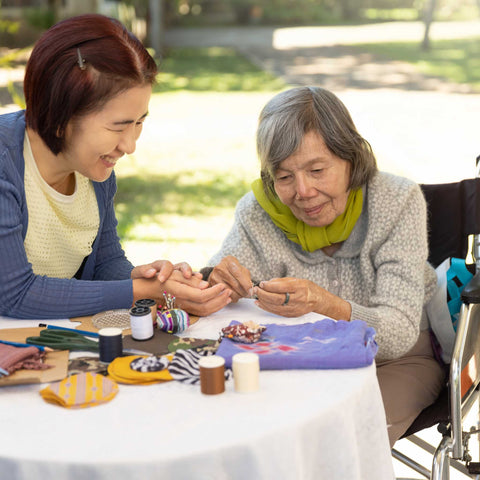As time marches on, many of us find the roles reversing; the caregivers become the cared-for, and adult children step into the shoes of caretakers for their aging parents. This transition is not just a journey of logistical arrangements—it's an emotional voyage filled with both rewarding moments and considerable challenges.
Tackling the task of caring for elderly parents is akin to navigating a complex labyrinth of healthcare, emotional support, and daily logistics, all while balancing our own lives.
From ensuring their safety and comfort to managing medical appointments and dealing with potential mobility issues or diseases like dementia, the spectrum of caregiving tasks is broad and deeply impactful. This guide aims to illuminate the path, offering support, advice, and a community of understanding for those embarking on this heartfelt journey. Let's explore together how to navigate these challenges with compassion and resilience, ensuring our parents' golden years are as fulfilling and joyful as possible.
Spotting the Signs: When More Help is Needed
Entering the world of caregiving often begins with noticing the small changes—a forgotten name here, a missed appointment there. It's essential to recognize these signs early on, as they can indicate that our elderly parents might require more support than currently provided.
Look out for indicators such as a decline in personal hygiene, noticeable weight loss or gain, unexplained bruises, or a lack of interest in previously enjoyed activities. These changes can signal that it's time to consider additional care or support.
Decoding the Signals: Professional Help on the Horizon
When these signs start to paint a picture of need, it might be time to explore professional help. Difficulty managing daily tasks, confusion over medication, or increased isolation can all be red flags. This doesn't mean losing independence; rather, it's about enhancing quality of life. Whether it's bringing in home health aides, considering a move to an assisted living facility, or scheduling regular check-ins from healthcare providers, acknowledging the need for professional help is a step toward ensuring safety, health, and happiness for our aging loved ones.
Caring 101: Nurturing Our Aging Parents
The journey of caring for our elderly parents is a mix of love, patience, and a sprinkle of challenge. From ensuring their daily care needs are met to managing their medical schedules, it’s about creating a supportive environment that champions their independence while providing the necessary support. Think of it as a dance, where sometimes you lead, and other times, you follow their rhythm, ensuring every step is taken with care and respect.
Special Care for Special Needs
When our parents live with chronic conditions or dementia, the caregiving dance gets a few more steps. These situations require us to be more attentive, patient, and creative. It's like being both a detective and a diplomat—figuring out what they need even when they can’t express it and negotiating daily activities in a way that respects their autonomy and dignity.
This means adapting your home for safety, learning about their conditions, and communicating with healthcare providers to manage symptoms and medications effectively. Remember, it’s about adding quality to their days, even as you navigate the complexities of their care.
Creating a Cozy Nook: Home Sweet Accessible Home
Welcome to the heart of a cozy, safe nest where love meets practicality. Modifying your home for accessibility and safety isn’t just about ramps and grab bars; it’s about crafting a space where your elderly parents can thrive, move freely, and feel the warmth of home without the barriers. Imagine turning stairs into smooth rides with chair lifts or transforming bathrooms into havens of safety with walk-in tubs and non-slip tiles.
It's about blending comfort with safety, making each room a chapter of ease and care.
Tech to the Rescue: Independence Empowered by Innovation
In our digital age, technology isn't just for the young. It's a bridge to independence for our aging parents too. Think of smart home devices that turn off forgotten stoves, wearable gadgets that alert you in case of falls, or video doorbells that bring the world to their fingertips without stepping outside. These aren't just gadgets; they're your allies in caring, giving your parents the gift of independence while providing you peace of mind.
So, let's weave technology into the fabric of their daily living, creating a home environment where age is just a number, and the spirit of independence dances in every corner.
Navigating the Healthcare Labyrinth: A Caregiver's Map
Stepping into the world of healthcare management for your elderly parents can feel like navigating a complex maze. It's not just about doctor's visits and medication schedules; it's about ensuring comprehensive care that encompasses their physical, emotional, and mental health. Coordinate with healthcare professionals to develop a streamlined plan that addresses all aspects of their well-being.
This proactive approach helps prevent complications and ensures your parents receive the care they deserve, turning the healthcare maze into a well-marked path towards optimal health.
Unlocking Support: Government Assistance for Caregivers
In the journey of caregiving, you're not alone. There are numerous government assistance programs designed to support caregivers like you. From financial aid to respite services, these programs are lifelines that help manage the costs and challenges of elder care.
Research programs such as Medicaid, Medicare, or state-specific benefits that can provide substantial support. Applying for these programs can be a stepping stone to gaining the resources you need, ensuring you have the support to continue providing the best care for your aging parents while also caring for yourself.
Balancing Acts: Juggling Work and Caregiving

Managing your professional life while caring for elderly parents is a high-wire act that requires both precision and grace. To keep your career and caregiving responsibilities in harmony, consider flexible work arrangements like telecommuting, adjusted hours, or even part-time positions if feasible. Open communication with your employer about your situation can lead to mutual understanding and possible adjustments in your work schedule.
This balance allows you to maintain your professional effectiveness while being there for your parents when they need you most.
Know Your Rights: Legal Protections for Caregivers
As a caregiver, you're not just a hero at home; you're also protected by law in the workplace. Familiarize yourself with legislation such as the Family and Medical Leave Act (FMLA) in the United States, which allows eligible employees to take unpaid, job-protected leave for family and medical reasons. Understanding your legal rights and protections helps you advocate for yourself at work, ensuring you can provide care without risking your job security. This knowledge empowers you to manage your dual roles effectively, safeguarding your career while attending to your family’s needs.
Building Your Support Network: The Key to Sustainable Caregiving
Creating a strong support network is essential when you're caring for elderly parents. This network can include family members, friends, neighbors, and caregiving professionals who can share the load. It’s important to reach out, delegate tasks, and sometimes just have someone to talk to who understands your challenges.
Connecting with others in similar situations provides not just practical support, but also emotional strength to continue caring for your loved ones without burning out.
Finding Your Tribe: Support Groups and Resources
There are numerous support groups and resources specifically tailored for caregivers. These groups offer a space to share experiences, advice, and encouragement, helping you feel less isolated.
Organizations such as the AARP and local community centers often host meetings and workshops, providing tools and knowledge that can make your caregiving journey smoother. Additionally, online forums and social media groups can be invaluable, offering access to a larger community of support at any time of the day, helping you to find answers and friendship even during late-night challenges.
Caring for Elderly Parents with Dementia: Specialized Strategies

Caring for a parent with dementia presents unique challenges that require specialized strategies. It’s crucial to establish routines that create a sense of stability and familiarity for your loved one. Safety becomes paramount, so consider adaptations to the living environment to minimize risks.
Additionally, engaging your parents in simple activities that they enjoy and are able to perform can enhance their quality of life and help maintain their cognitive functions for as long as possible.
Communication and Connection in Dementia Care
Effective communication is key when caring for a parent with dementia. Use simple, clear sentences and maintain eye contact to ensure understanding. It’s also important to use non-verbal cues such as touch and facial expressions to convey your message and feelings. Preserving emotional connections is vital; reminisce about the past with them through photos and familiar music, which can provide comfort and moments of clarity. These strategies not only aid in communication but also help in maintaining a strong emotional bond, making the caregiving journey more fulfilling and heartening.
Dealing with Stress and Emotional Strain: Recognizing Caregiver Stress
Caring for elderly parents, especially those with special needs, can be a rewarding yet emotionally taxing journey. It's essential to recognize the signs of caregiver stress—such as feeling overwhelmed, persistent worry, or physical symptoms like fatigue and changes in sleep patterns. Acknowledging these signs early is the first step toward managing them effectively.
Preserving Your Mental Health as a Caregiver
Maintaining your mental health is crucial, not just for you but for the quality of care you provide. Implement techniques that bolster your well-being, such as regular physical activity, adequate rest, and healthy eating. Don’t underestimate the power of a support network; sharing your experiences with friends, family, or caregiver support groups can provide emotional relief and practical advice. Additionally, consider setting aside time for hobbies and interests that rejuvenate your spirit and provide a respite from caregiving duties.
These strategies are key to preserving your health and ensuring you can continue to provide the loving care your aging parents need.
Caring for Yourself While Caring for Others: Embracing Self-Care

Caring for elderly parents is a noble and loving task, but it’s equally important to care for yourself. Self-care isn’t a luxury; it’s a necessity that sustains your ability to be an effective caregiver. Prioritizing your own health and well-being ensures you have the energy and resilience to face the challenges of caregiving without burning out.
Maintaining Personal Health and Wellness
Make sure to integrate practical self-care strategies into your daily routine. This might include setting aside time for exercise, which can boost both your physical and mental health. Ensure you're eating well-balanced meals that fuel your body for the demanding role you play.
Regular medical check-ups are crucial, not just for your elderly parents, but for you too. Also, seek ways to stay socially connected; isolation can quickly lead to depression and anxiety. Remember, taking care of yourself isn’t selfish—it’s essential for maintaining the stamina required to care for someone else.
Preparing for the Future: Ensuring Long-term Care and Security
Planning for Long-term Care Needs
As your parents age, it’s crucial to discuss and plan for their long-term care needs. This might involve exploring options like home care, assisted living, or nursing facilities depending on their health requirements. Early planning can prevent last-minute decisions that may not fully meet your parents' needs or align with their wishes.
Engage in open and compassionate conversations with your parents about their preferences for future care to ensure they feel respected and involved in the planning process.
Legal and Financial Considerations
Navigating the legal and financial aspects of elderly care is essential for a smooth transition into different care stages. This includes setting up power of attorney, health care proxies, and possibly a living will to ensure that your parents’ health and financial affairs are handled according to their wishes if they’re no longer able to make decisions for themselves.
Consulting with a financial advisor or an elder law attorney can provide clarity and help in structuring their assets to fund their long-term care needs effectively. It’s also beneficial to understand the scope of government assistance programs that can provide financial support under specific conditions.
Preparing for the future isn’t just about making plans; it’s about ensuring peace of mind for both you and your elderly parents. By addressing these topics proactively, you can mitigate challenges and ensure that your parents receive the care they deserve in their later years, all while safeguarding their dignity and your family’s financial stability.
Conclusion: Navigating the Journey with Compassion and Support

Caring for elderly parents is more than a responsibility; it's a profound act of love and compassion. It reflects our commitment to honoring the lives they've led and the sacrifices they've made. This journey, while often challenging, is rich with opportunities to deepen bonds and create lasting memories.
As you navigate the complexities of caregiving, remember you're not alone. Lean on the support and resources available to you—from local community centers to online forums and professional agencies. These supports can offer guidance, relief, and the companionship of others on similar paths.
Encourage yourself to reach out, share your experiences, and seek the help you need. By doing so, you strengthen your ability to provide the best care for your parents while also taking care of your own well-being.
Embrace this journey with an open heart, knowing that each step you take is built on love and respect for the family members who once cared for you. It's not just about managing daily care needs or navigating medical appointments; it's about enriching the lives of your loved ones with dignity and grace.
Let’s continue to share our stories and solutions, forging a path forward together in this important phase of life. Here’s to finding strength in community and resilience in our shared experiences.
Join the Conversation: Share Your Story
We invite you to share your experiences and wisdom in caring for aging parents. Whether it's a creative solution you've discovered, a challenge you're facing, or advice you wish you had known sooner, your stories are invaluable. By sharing, you not only enrich your own caregiving journey but also help others who are navigating similar paths.
Connect and Grow with Community Support
We also encourage you to engage with local caregiver support groups and online forums. These communities offer a wealth of resources, emotional support, and practical tips that can make all the difference in your caregiving experience.
Connecting with others who understand can provide comfort and insights that help you manage the demands of caregiving with confidence and compassion. Join these communities to find strength in numbers and kindness in shared experiences.
Leave your comments below; we love to hear from you! And don't forget to follow Easy Peasie for more veggie info and convo on YouTube, Facebook, and Instagram! ~ThePeas













